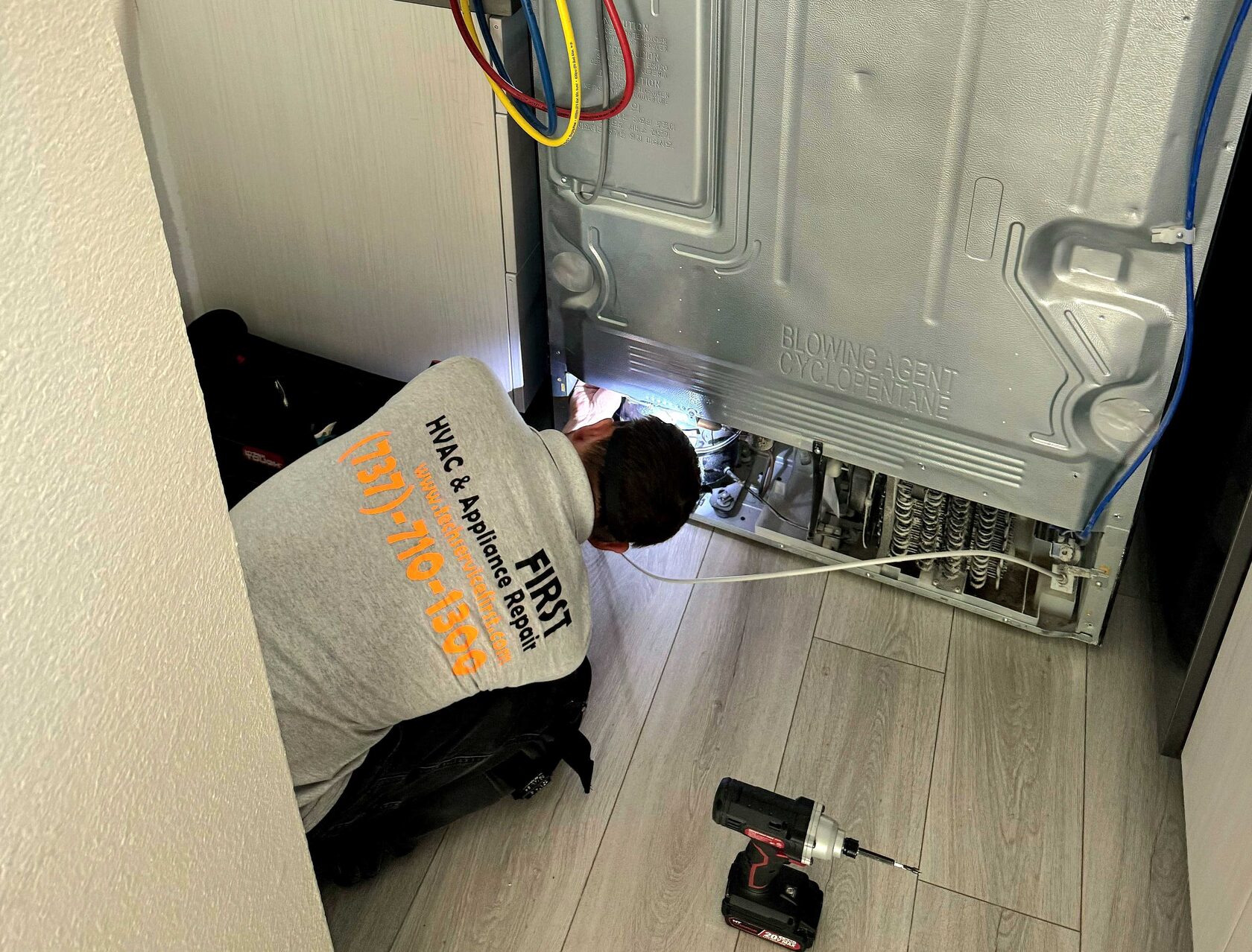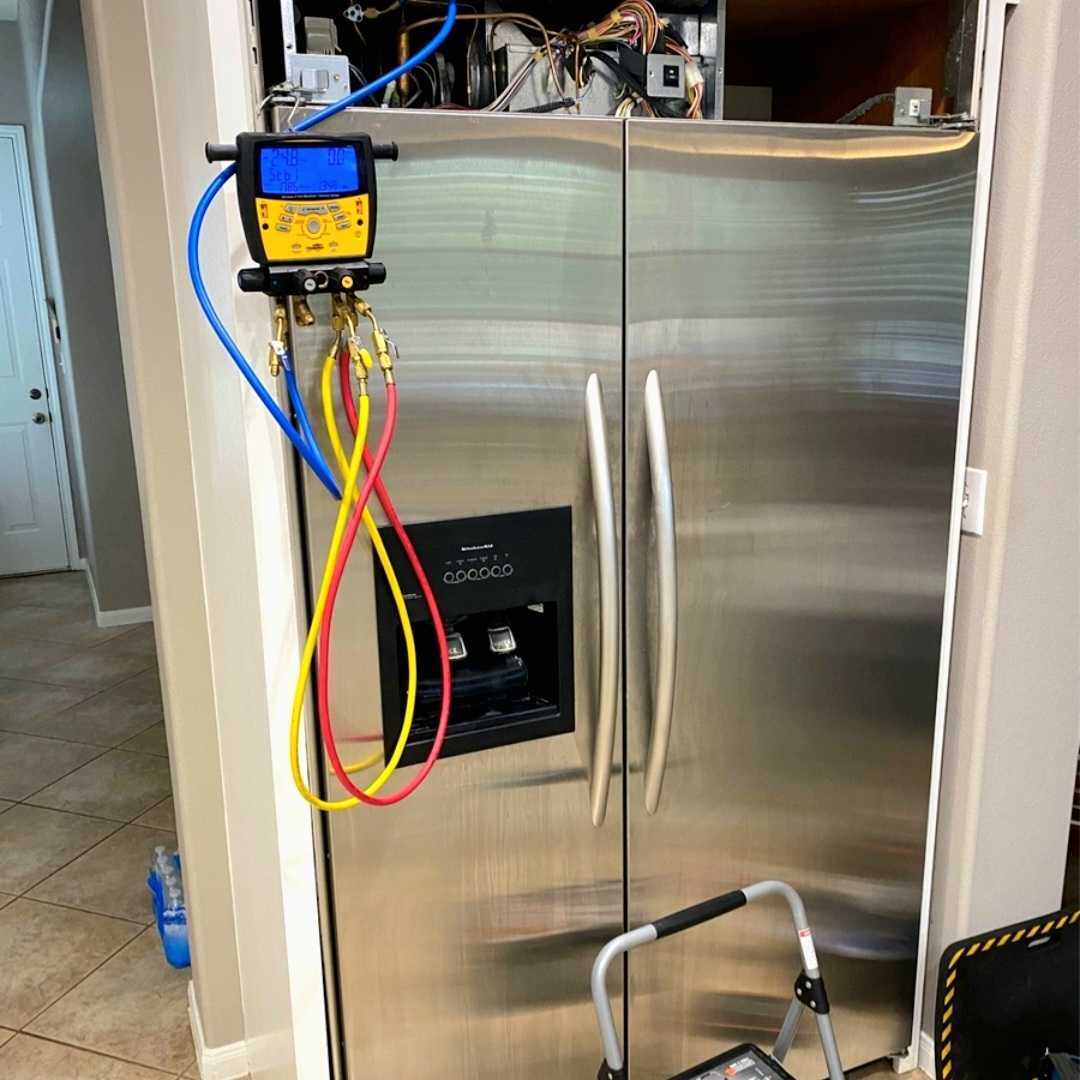I. Introduction
If you have a refrigerator, you might encounter a Freon leak at some point in its lifespan. A Freon leak can cause a range of issues that can compromise the efficiency of your appliance and pose safety risks. In this article, we'll discuss the common indicators of a Freon leak, how to differentiate a leak from other common refrigerator issues, and what to do if you suspect a leak.
II. Signs of a Freon Leak

A. Common indicators of a Freon leak
Here are some common indicators of a Freon leak in your refrigerator:
If you notice any of these indicators, it's important to take action to prevent further damage and ensure your safety.
B. Differentiating a Freon leak from other common refrigerator issues
Here are some ways to differentiate a Freon leak from other common refrigerator issues:
If you suspect a Freon leak, it's important to take action immediately to prevent further damage to your refrigerator and to avoid any safety hazards.
C. What to do if you suspect a Freon leak
Contact a professional technician!
If you suspect that your refrigerator has a Freon leak, it's important to contact a licensed technician who is trained and equipped to diagnose and repair the issue.
Here are some common indicators of a Freon leak in your refrigerator:
- Warm temperature: If the temperature inside the refrigerator is warmer than it should be, it could be a sign of a Freon leak. The refrigerant helps to cool the air, so a leak can cause the temperature to rise.
- Frost buildup: A Freon leak can cause the evaporator coils in the refrigerator to freeze up, leading to frost buildup on the walls and shelves.
- Unusual sounds: If you hear hissing, gurgling, or bubbling sounds coming from your refrigerator, it could indicate a Freon leak. The sound is caused by the refrigerant circulating through the system.
- Oily residue: Freon has an oily texture, so if you notice any oily residue on the outside or inside of the refrigerator, it could be a sign of a leak.
- Foul odor: A Freon leak can also cause a foul odor to emanate from the refrigerator. This smell can be similar to that of ether or acetone.
- Higher electricity bill: If you have noticed a spike in your energy bills during both the winter and summer months, it's a good idea to inspect all of your appliances for potential faults. A constantly running motor in your refrigerator due to a Freon leak can result in increased energy consumption.
- Refrigerator motor constantly runs: If your refrigerator has a Freon leak, the motor will be required to run for longer periods of time to compensate for the incorrect amount of refrigerant. This can put a strain on the motor, eventually leading to motor failure.
If you notice any of these indicators, it's important to take action to prevent further damage and ensure your safety.
B. Differentiating a Freon leak from other common refrigerator issues
Here are some ways to differentiate a Freon leak from other common refrigerator issues:
- Check the temperature: If your refrigerator is not maintaining a consistent temperature, it could be a sign of a Freon leak.
- Listen for unusual sounds: If your refrigerator is making loud or unusual sounds, it could indicate a Freon leak.
- Check for frost buildup: If you notice frost buildup on the walls or shelves of your refrigerator, it could be a sign of a Freon leak.
- Inspect for oily residue: If you notice an oily residue on the outside or inside of your refrigerator, it could be a sign of a Freon leak.
If you suspect a Freon leak, it's important to take action immediately to prevent further damage to your refrigerator and to avoid any safety hazards.
C. What to do if you suspect a Freon leak
Contact a professional technician!
If you suspect that your refrigerator has a Freon leak, it's important to contact a licensed technician who is trained and equipped to diagnose and repair the issue.
III. Locating the Leak

A. Methods for Locating Refrigerant Leaks
There are several methods that can be used to locate refrigerant leaks in a refrigerator. Here are some of the most common ones:
It's important to note that refrigerant is a hazardous substance and can be harmful to your health if inhaled. Only trained professionals should attempt to locate and repair refrigerant leaks in refrigerators.
There are several methods that can be used to locate refrigerant leaks in a refrigerator. Here are some of the most common ones:
- Visual Inspection: A technician may conduct a visual inspection of the refrigerator, looking for any signs of a leak such as frost buildup or oily residue.
- Soap Bubbles: A technician may apply a solution of soapy water to the refrigerant lines, coils, and fittings to check for leaks. If there is a leak, the soap will form bubbles at the site of the leak.
- Electronic Leak Detector: An electronic leak detector is a handheld device that can detect refrigerant leaks in the refrigerator. The device works by sensing the refrigerant in the air and alerting the technician when it detects a leak.
- UV Dye: A UV dye can be added to the refrigerant, which will make any leaks visible under UV light. The technician can use a UV light to identify the source of the leak.
- Pressure Testing: A technician may use a pressure gauge to test the pressure levels in the refrigerant lines. If there is a leak, the pressure levels will drop.
It's important to note that refrigerant is a hazardous substance and can be harmful to your health if inhaled. Only trained professionals should attempt to locate and repair refrigerant leaks in refrigerators.
IV. Fixing the Leak
A. Repairing a Freon Leak
Repairing a Freon leak in a refrigerator can be a complex process, and it's important to hire a licensed refrigeration technician to perform the repair. Here are some steps that a technician may take to repair a Freon leak:
It's important to note that Freon is a hazardous substance and can be harmful to your health if inhaled. Only trained professionals should attempt to repair Freon leaks in refrigerators. If you suspect a Freon leak, it's important to contact a licensed refrigeration technician who can properly diagnose and repair the issue.
Benefits of Hiring a Professional
There are several benefits to hiring a professional refrigeration technician to diagnose and repair a Freon leak in a refrigerator:
Expertise: Professional technicians have the training and expertise needed to properly diagnose and repair Freon leaks. They are familiar with the latest technologies and techniques and can quickly identify the source of the problem.
Safety: Freon is a hazardous substance and can be harmful to your health if inhaled. Professional technicians have the equipment and knowledge needed to safely handle and dispose of Freon, ensuring that your home and family are not put at risk.
Efficiency: Professional technicians can quickly diagnose and repair Freon leaks, minimizing the amount of time that your refrigerator is out of commission. This can be particularly important if you rely on your refrigerator for storing perishable food items.
Warranty protection: If your refrigerator is still under warranty, attempting to repair the leak yourself or hiring an unlicensed technician could void your warranty. Professional technicians are typically authorized by manufacturers to perform warranty repairs, ensuring that your warranty remains intact.
Long-term savings: While it may be tempting to attempt to repair a Freon leak yourself or hire an unlicensed technician to save money, this can actually end up costing you more in the long run. A professional repair is more likely to be done correctly the first time, reducing the likelihood of future breakdowns and repairs. Additionally, a professional repair can help extend the lifespan of your refrigerator, saving you money on replacement costs.
C. Preventing future Freon leaks
Preventing future Freon leaks in your refrigerator can help you avoid the hassle and expense of repairs. Here are some tips to help prevent Freon leaks:
By following these tips, you can help prevent Freon leaks in your refrigerator and keep it running smoothly for years to come.
Repairing a Freon leak in a refrigerator can be a complex process, and it's important to hire a licensed refrigeration technician to perform the repair. Here are some steps that a technician may take to repair a Freon leak:
- Identify the location of the leak: Before repairing the leak, the technician must identify the location of the leak. This can be done using one of the methods mentioned earlier, such as a refrigerant leak detector or visual inspection.
- Remove any remaining refrigerant: If there is any remaining refrigerant in the system, the technician will need to remove it before proceeding with the repair. This is typically done using a recovery machine.
- Repair the leak: The method used to repair the leak will depend on the location and severity of the leak. Common methods include replacing damaged or worn components, such as the evaporator coil or the refrigerant lines, or tightening loose connections.
- Evacuate and recharge the system: Once the leak has been repaired, the technician will need to evacuate any air or moisture from the system using a vacuum pump. They will then recharge the system with the appropriate amount of refrigerant.
- Test the system: After recharging the system, the technician will test it to ensure that it is cooling properly and that there are no further leaks.
It's important to note that Freon is a hazardous substance and can be harmful to your health if inhaled. Only trained professionals should attempt to repair Freon leaks in refrigerators. If you suspect a Freon leak, it's important to contact a licensed refrigeration technician who can properly diagnose and repair the issue.
Benefits of Hiring a Professional
There are several benefits to hiring a professional refrigeration technician to diagnose and repair a Freon leak in a refrigerator:
Expertise: Professional technicians have the training and expertise needed to properly diagnose and repair Freon leaks. They are familiar with the latest technologies and techniques and can quickly identify the source of the problem.
Safety: Freon is a hazardous substance and can be harmful to your health if inhaled. Professional technicians have the equipment and knowledge needed to safely handle and dispose of Freon, ensuring that your home and family are not put at risk.
Efficiency: Professional technicians can quickly diagnose and repair Freon leaks, minimizing the amount of time that your refrigerator is out of commission. This can be particularly important if you rely on your refrigerator for storing perishable food items.
Warranty protection: If your refrigerator is still under warranty, attempting to repair the leak yourself or hiring an unlicensed technician could void your warranty. Professional technicians are typically authorized by manufacturers to perform warranty repairs, ensuring that your warranty remains intact.
Long-term savings: While it may be tempting to attempt to repair a Freon leak yourself or hire an unlicensed technician to save money, this can actually end up costing you more in the long run. A professional repair is more likely to be done correctly the first time, reducing the likelihood of future breakdowns and repairs. Additionally, a professional repair can help extend the lifespan of your refrigerator, saving you money on replacement costs.
C. Preventing future Freon leaks
Preventing future Freon leaks in your refrigerator can help you avoid the hassle and expense of repairs. Here are some tips to help prevent Freon leaks:
- Proper maintenance: Regular maintenance of your refrigerator can help prevent Freon leaks. This includes cleaning the coils and fan, checking the door seals, and ensuring that the temperature settings are correct.
- Avoiding physical damage: Avoid hitting, banging, or dropping your refrigerator, as this can cause damage to the refrigerant lines and lead to leaks.
- Proper installation: If you are installing a new refrigerator or having an old one moved, make sure that it is properly installed. Improper installation can cause damage to the refrigerant lines and lead to leaks.
- Regular inspections: If you suspect a Freon leak, have a professional refrigeration technician inspect your refrigerator. Regular inspections can help detect and address potential issues before they turn into major problems.
By following these tips, you can help prevent Freon leaks in your refrigerator and keep it running smoothly for years to come.

V. Conclusion
Detecting and fixing Freon leaks in your refrigerator is important for a variety of reasons. Not only can Freon leaks harm the environment, but they can also be dangerous to your health and safety. In addition, Freon leaks can cause your refrigerator to work less efficiently, which can lead to higher energy costs. A qualified technician can help you locate and fix the leak, and can also provide you with advice on how to prevent future leaks.
In conclusion, detecting and fixing Freon leaks is an important step in maintaining the safety and efficiency of your refrigerator. By following the steps outlined in this guide and seeking professional assistance when needed, you can ensure that your refrigerator is functioning safely and efficiently for years to come. Remember to prioritize regular maintenance and inspections to minimize the risk of future leaks.
In conclusion, detecting and fixing Freon leaks is an important step in maintaining the safety and efficiency of your refrigerator. By following the steps outlined in this guide and seeking professional assistance when needed, you can ensure that your refrigerator is functioning safely and efficiently for years to come. Remember to prioritize regular maintenance and inspections to minimize the risk of future leaks.
Too complicated? Need professional help?
Call us at (737) 710-1606 or schedule an appointment for today or when it suits your schedule!
Call us at (737) 710-1606 or schedule an appointment for today or when it suits your schedule!











